Main navigation
Holden Comprehensive Cancer Center has hosted a successful summer undergraduate cancer research program for nearly 20 years.
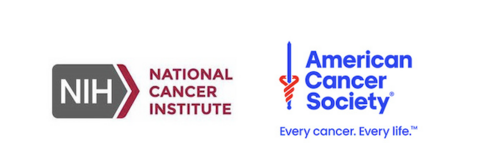
Funded by the American Cancer Society and the National Cancer Institute at the National Institutes of Health R25 YES grant, and with support from the University of Iowa Carver College of Medicine, Office of Education Support, and Holden Comprehensive Cancer Center, this 10-week summer program offers undergraduates the opportunity to immerse themselves in the field of cancer research. Participants design and conduct their own projects in state-of-the-art cancer laboratories, receiving support from faculty mentors and participating in career development workshops. The program concludes with both oral and poster presentations, enabling participants to showcase their work and develop essential scientific communication skills.
Our goal is for all interns to leave the program with greater scientific knowledge, research experience, friendships, professional connections, and confidence in their career trajectory.
The application is closed for Summer 2026.
We always welcome your emails: HCCC-Summer@healthcare.uiowa.edu.
Virtual Information Sessions
Please email HCCC-Summer@healthcare.uiowa.edu for the Zoom link.
Session dates:
Tuesday, November 18th from 11am-noon CST
Friday, December 12th from 2pm-3pm CST
Wednesday, January 14th from 1-2pm CST

155 +

95 %
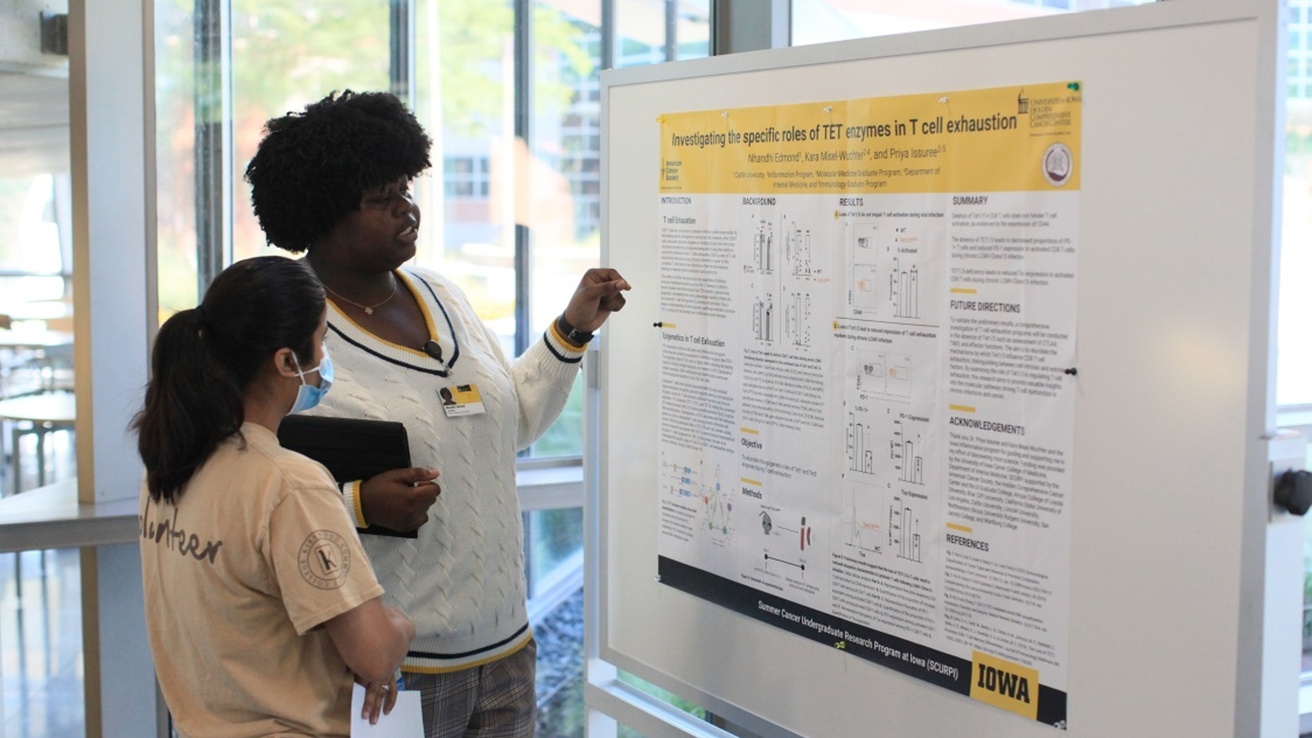
10 weeks

Program Features
- A course on cancer taught by leaders in cancer research
- A research project guided by a near-peer mentor (such as a graduate student or postdoctoral fellow) and a faculty mentor
- Career development programming
- Creating a scientific poster and oral presentation on your research, and giving presentations
- A clinician shadowing opportunity, pending availability
- Opportunities for social events
Eligibility
- Undergraduates in biomedical sciences or a related degree field. Can be a student at a university, college, or community college.
- Although a minimum cumulative GPA of 3.0 is preferred, applicants with a GPA of 2.5-2.9 may be considered in certain cases.
- Those in a 4-year degree program should have completed their sophomore or junior year before the summer (must have at least one semester remaining of their Bachelor's degree after the summer of 2026). Students in a 2-year degree program are preferred to be entering the final year of their associate degree or in the summer before transferring to a 4-year college.
- U.S. citizens/permanent residents.
- Must be able to participate in the program full-time.
- No prior experience necessary- in fact, we give preference to students who have not had the opportunity to conduct biomedical research outside of class labs.
Application Preparation
You should be prepared to have the following:
- The contact information for two faculty members who will write your letters of recommendation
- Your unofficial college-level transcripts
The following questions will be asked:
- Why do you want to attend this program? What do you hope to gain from this experience? (1-2 paragraphs)
- What do you find exciting about science and cancer research? (1-2 paragraphs)
- Have you had any research experience before, in school/college, or in other areas? Have you had any barriers to participating in research experiences other than class labs?
- What are your career aspirations? (1-2 paragraphs)
- (Optional) Please address any concerns you may have in your application. If, for example, you do not believe that your academic credentials demonstrate your true capabilities, please explain why. Also, describe any gaps in your academic career or any extenuating circumstances of which the selection committee should be made aware. (350 word limit)
FAQs
When is the program?
Interns will arrive in Iowa City and move into the dorm on Saturday, May 23, 2026. They depart on Thursday, July 30, 2026.
Do I have to have research experience already?
Prior research experience is not required. We are aware that many colleges and universities do not have research opportunities or are limited in their offerings.
Do I need to attend the entire program?
Yes, but exceptions can be made in certain cases. For example, if finals week conflicts with the start of the program. We encourage applying first, and then we will discuss the circumstances. After arrival, participation in all required events is mandatory.
What will I do?
The program includes a course on cancer, intensive research experience, mentoring, and professional development opportunities, including creating and presenting a scientific poster and oral presentation. The program is full-time (40 hours per week), which includes all of the required and recommended activities and research time. Interns will have a near-peer mentor from their lab who will provide direct support in the laboratory. Most workdays will be spent conducting research.
Interns are expected to work and attend CROI programming full-time from Monday through Friday. This includes any time spent on program activities. Weekends are considered free time, and we hope interns take that time to relax and fully enjoy living in Iowa City.
What kind of research is available?
Holden Comprehensive Cancer Center faculty come from various research disciplines across colleges (Medicine, Nursing, Engineering, Liberal Arts and Sciences, and Pharmacy). Cancer research takes many forms in different types of laboratories and research settings.
- Basic sciences, also known as wet lab research, such as analyzing chemicals or biological samples, animal research, microscopy, and genetics
- Nursing research, such as the health outcomes of patients treated for cancer and the management of symptoms
- Bioengineering, working on the creation of medical devices
- Computer-based research
Who will be my mentor?
The CROI application will ask about research interests. It is important to select all topics or types of research that may be of interest to you. The program director will use this information to assign interns to the best mentor and laboratory fit. Interns will be able to communicate with their chosen mentor before the start of the program. Please note that the mentor, especially if also a clinician or administrator, may have other responsibilities and may not be in the lab regularly. The actual mentors available for CROI mentorship in 2026 depend on many factors.
Who will be my near-peer mentor?
The near-peer mentor will be a graduate student, post-baccalaureate intern, postdoc, or other staff member who is part of your mentor's lab. They will be chosen by the mentor based on their research and ability to provide a teaching role.
What can I expect when I am in a lab?
Labs have different expectations regarding when to report to the lab, which meetings to attend, and the training necessary for equipment and animal research (if applicable). The near-peer mentor will provide most of the daily training and support.
What will my project be?
Research projects are selected by the mentor and near-peer to be an individual project that can be completed during the internship. It will be related to the current lab research. Wth the help of their mentors, interns will create and present a scientific poster and give a short oral presentation at the end of the program.
How do I get there? Will I need to pay?
Interns traveling by plane will have their flights arranged by and paid for by the program. Those traveling via personal car will be reimbursed for their mileage. Additional travel costs may also be reimbursed in accordance with University of Iowa regulations. Interns who will have their personal car on campus will receive free parking at the Hancher parking lot. This lot is located about 1.4 miles from Petersen Hall and is serviced by a free University of Iowa bus.
How much do I get paid? Are the payments taxable?
Summer program interns are provided with a stipend of $6500 (gross) over the 10-week program. The net amount is lower due to social security, Medicare, and income taxes. Interns will complete a W-4 form and choose their allowances, which will also impact their take-home pay.
Interns may choose to use any amount of their stipend for food. Meal plans and additional food for meals are not provided by the program.
Stipend payments will be deposited electronically directly into the intern's bank account. CROI is supported by two grants, each having different requirements for how the payments can be made.
Please see IRS 2023 publication 970. The CROI stipend is not considered to be a scholarship. CROI is a non-credit, non-degree program with no tuition. The stipend is intended for room and board.
Where will I live?
Interns will be housed in Petersen Residence Hall, located on the west side of campus near the biomedical laboratories. They will live in a double room with a same-sex roommate. Petersen Hall has one kitchen, which is available for use by one resident at a time. The program provides some basic non-food cooking supplies.
Is there a place to work out?
We provide free summer passes to the Campus Recreation and Wellness Center. The 20,000 sq ft fitness space includes a climbing wall, two swimming pools, a jogging track, basketball courts, and over 200 pieces of training equipment and free weights. It is located 5 blocks from Petersen Hall.
How will I get around town?
The Iowa City area has three bus systems: the Cambus (University), the Iowa City buses, and the Coralville buses. Coralville is a smaller city that adjoins Iowa City. "Transit" is a free mobile app that tracks all three bus systems and has trip planning.
Petersen Hall is located near the medical science part of the University of Iowa campus. It is just a 15-minute walk to downtown Iowa City.
What is the weather like?
Average daily low and high temperatures range from the 60s to the 90s. Rain or thunderstorms can occur, and the air tends to be humid. An umbrella or raincoat is suggested. Weather that can produce tornadoes can also occur in Iowa.
Do I need my own health insurance?
Interns are required to have their own health insurance for the duration of the program.
CROI Leadership

Jon Houtman, PhD

Jessica Sieren, PhD
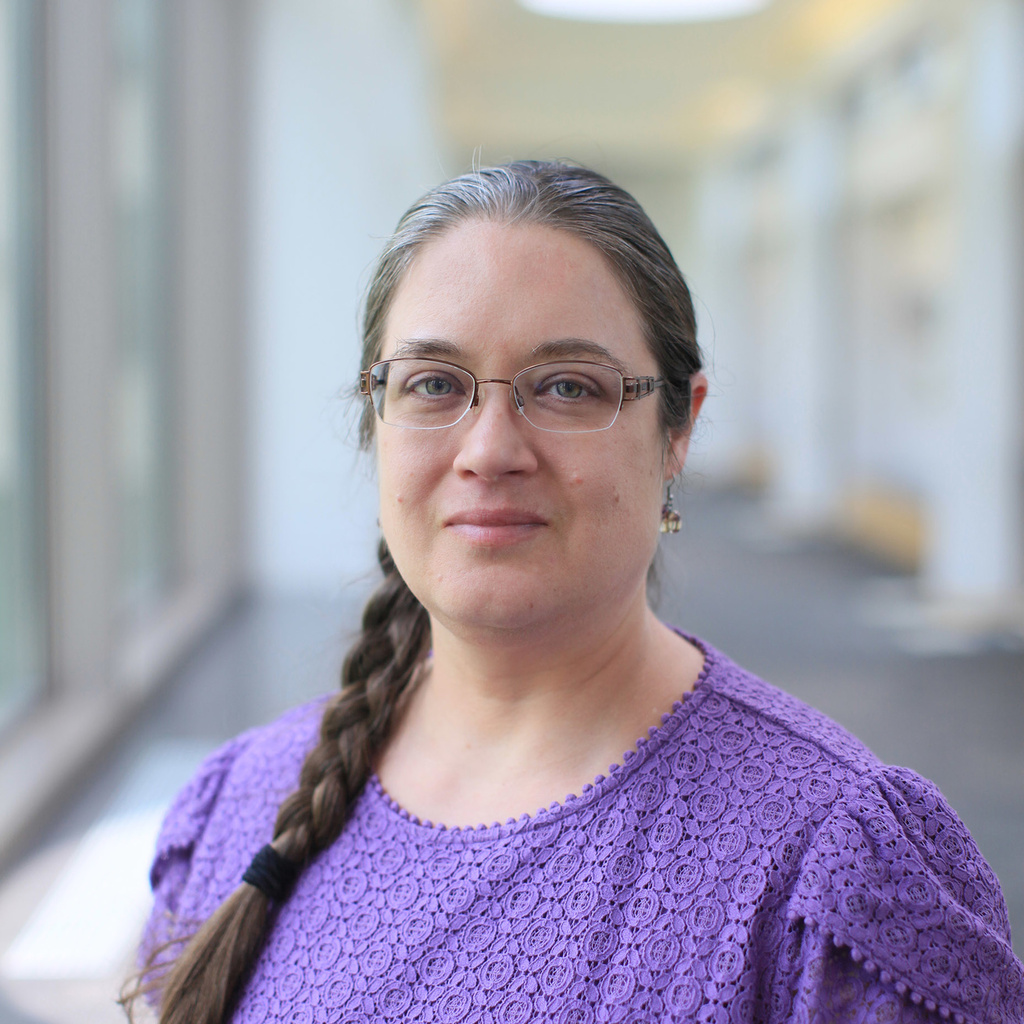
Alicia Denman
Faculty Mentors
Bryan Allen, MBA, MD, PhD
Dr. Allen is the Chair and DEO of Radiation Oncology, Associate Professor and Associate Chair of Translational Research, and Director of Experimental Therapeutics at Holden.
Interests: understanding the basic science mechanisms by which pharmacological ascorbate can selectively act as a pro-oxidant in brain and lung cancer vs. normal cells, for the purpose of developing novel combined modality chemo-radiotherapies
Gail Bishop, PhD
Dr. Bishop is a Professor of Microbiology and Immunology and Associate Director of Basic Science Research at Holden.
Interests: molecular mechanisms underlying lymphocyte activation and tolerance, interactions between innate and adaptive immune receptors
Dustin Bosch, MD, PhD
Dr. Bosch is an Assistant Professor of Pathology.
Interests: gut microbiome, bacteroidetes, interbacterial interactions among colonic commensals
John Buatti, MD
Dr. Buatti is a Professor of Radiation Oncology.
Interests: use of imaging outcomes for patients undergoing cancer therapy, tools and algorithms for quantitative imaging assessments, radiation therapy
Mark Burkard, MD, PhD
Dr. Burkard is a Professor in Internal Medicine-Hematology Oncology and Director of the Holden Cancer Center.
Interests: breast cancer, genomic changes in breast cancer, precision medicine, immunotherapy
James Byrne, MD, PhD
Dr. Byrne is an Assistant Professor of Radiation Oncology.
Interests: developing transformative technologies to improve patient care, such as the development of biofoams that hold great promise in enhancing the effectiveness of chemotherapy and radiation therapy for rectal cancer patients
Joseph Caster, MD, PhD
Dr. Caster is an Assistant Professor in Radiation Oncology.
Interests: identifying novel ways of improving the therapeutic index of chemoradiotherapy, i.e. improving treatment the efficacy of chemoradiation and/or minimizing its toxicity
Catherine Cherwin, PhD, RN
Dr. Cherwin is an Assistant Professor of Nursing.
Interests: cancer symptom science, gastrointestinal microbiome, symptom clusters, non-pharmacologic management of symptoms
Gary Christensen, DSc
Dr. Christensen is a Professor of Computer and Electrical Engineering, and Radiation Oncology.
Interests: medical imaging, global shape models, 3D visualization, computer architecture, parallel computing, modeling body and brain anatomy
John Colgan, PhD
Dr. Colgan is an Associate Professor of Internal Medicine-Immunology and Anatomy and Cell Biology.
Interests: understanding the transcriptional mechanisms that control lymphocyte development and function; the importance of GON4L for the growth and survival of leukemias that arise from B and T cell precursors
David Cwiertny, PhD
Dr. Cwiertny is a Professor of Civil and Environmental Engineering and Chemistry.
Interests: materials-based treatment strategies for water and wastewater, chemical transformation pathways for emerging contaminant classes in natural aquatic systems
Sanjana Dayal, PhD
Dr. Dayal is an Associate Professor of Internal Medicine-Hematology, Oncology, and Blood and Marrow Transplantation.
Interests: investigating mechanisms of thrombosis under a variety of pathological conditions using sophisticated animal models and clinically relevant human samples
Kris DeMali, PhD
Dr. DeMali is a Professor of Biochemistry and Molecular Biology, and Dermatology.
Interests: carcinomas, cellular mechanisms involved in assembly and maintenance of cell-cell adhesions, the function and regulation of proteins recruited to the cytoplasmic face of cadherins
Rebecca Dodd, PhD
Dr. Dodd is an Associate Professor of Internal Medicine-Hematology, Oncology, and Blood and Marrow Transplantation.
Interests: soft-tissue sarcomas, genetics of sarcoma, tumor microenvironment, preclinical platform applications, novel genome editing tools
Melissa Fath, PhD
Dr. Fath is an Associate Research Scientist in Radiation Oncology.
Interests: metabolic differences between cancer cells and normal cells, new therapeutic regimens, translational research, defeating the mechanism tumor cells use to evade therapy
Ernesto Fuentes, PhD
Dr. Fuentes is an Associate Professor of Biochemistry and Molecular Biology.
Interests: signal transduction pertinent to human disease, molecular mechanisms governing specific signal transduction in eukaryotic and prokaryotic systems
David Gordon, MD, PhD
Dr. Gordon is an Associate Professor of Pediatrics- Hematology/Oncology.
Interests: Ewing sarcoma, creating genetically defined models of cancer, studying pathophysiology of Ewing sarcoma using human stem cell models, pediatrics
Jess Gorzelitz, PhD
Dr. Gorzelitz is an Assistant Professor in Health and Human Physiology.
Interests: physical activity and exercise in cancer survivorship, using innovative distance-based approaches to reach rural and underserved populations; the importance of muscle strengthening exercise for survivors to help reduce treatment related symptoms to focus on health through strength
Prajwal Gurung, PhD
Dr. Gurung is an Associate Professor of Internal Medicine-Infectious Diseases.
Interests: reducing inflammatory responses, how pattern recognition receptors are involved in sensing pathogen- and host-derived molecular patterns, roles of cytoplasmic sensors in health and disease
Jon Houtman, PhD
Dr. Houtman is a Professor of Microbiology and Immunology.
Interests: how current therapeutic agents are altering human T cell signaling and function, role of GRB2 in TCR signaling pathways, impact of GML on human T cell activation
Michelle Howard, PhD
Dr. Howard is an Assistant Professor of Radiation Oncology.
Interests: combining novel therapeutic agents and radiation therapy, pediatric cancers, increasing effectiveness of radiation using redox modulating drugs
Kaikobad Irani, MD
Dr. Irani is a Professor of Internal Medicine-Cardiovascular Medicine.
Interests: vascular function and dysfunction, regulation of aging proteins which promote oxidative stress, regulation of p66shc and SIRT1, micro-RNA-mediated mechanisms and micro-RNA-depended redox pathways
Priya Issuree, PhD
Dr. Issuree is an Assistant Professor of Internal Medicine - Infectious Diseases.
Interests: cell fate decisions shaping T cell immunity; fundamental mechanisms that dictate T cell development using the thymus as a model
Ali Jabbari, MD, PhD, FAAD
Dr. Jabbari is the Chair and Head of Dermatology and an Associate Professor.
Interests: cutaneous T cell lymphomas; identify the genetic and molecular perturbations among the different forms of CTCL to better match patients with treatment
Zhendong Jin, PhD
Dr. Jin is a Professor of Pharmaceutical Sciences and Experimental Therapeutics.
Interests: designing and developing the new generation of cytotoxic payloads with novel mechanisms of action; the interface of chemistry and biology of bioactive natural products
Jong Sung Kim, PhD
Dr. Kim is an Associate Professor of Occupational and Environmental Health.
Interests: nanotoxicology, exposomics, metabolomics, mechanistic toxicology, human risk assessment, and biomarkers
Bing Li, PhD
Dr. Li is a Professor of Pathology.
Interests: the role of fatty acid binding proteins (FABPs) that regulate immune cell lipid metabolism and function in the setting of a high fat diet
Yi Luo, MD, MS, PhD
Dr. Luo is a Professor of Urology.
Interests: role of regulatory T cells in controlling autoimmune cystitis, biological pathways and genes responsible for bladder cancer resistant to chemotherapy, new animal models for bladder cancer research
Vincent Magnotta, PhD
Dr. Magnotta is a Professor of Radiology-Neuroradiology.
Interests: novel imaging approaches and analysis strategies, diffusion tenor imaging, chemical shift imaging, analysis of brain morphology
Ashutosh Mangalam, PhD
Dr. Mangalam is an Associate Professor of Pathology.
Interests: gut microbiome, therapeutic potential of human gut derived bacteria as drug (BRUG) in inflammatory diseases such as MS
Adam Mailloux, PhD
Dr. Mailloux is an Assistant Professor of Microbiology and Immunology.
Interests: changes in the extracellular matrix in a tumor and effect on infiltrating effector cells, novel technology using tumor-derived HLA complex, deep immune profiling during the anti-tumor response to make novel gene-modified cell therapies
Thorsten Maretzky, PhD
Dr. Maretzky is an Assistant Professor in Internal Medicine.
Interests: innate immune system, inflammation, Host-Pathogen interaction, iRhoms in disease and development, A Disintegrin and metalloprotease activation and regulation
Xiangbing Meng, PhD
Dr. Meng is a Research Associate Professor in Pathology.
Interests: new prognosis biomarkers and potential therapeutic targets in gynecology, synthetic lethal studies in gynecology, Mitotic Catastrophe induction in ovarian and endometrial cancer
Michael O'Rorke, PhD
Dr. O'Rorke is an Assistant Professor in Epidemiology.
Interests: Triple negative breast cancer (TNBC), molecular/clinical/cancer/pharmaco- epidemiology, biomarkers of treatment response and prognostication
Miles Pufall, PhD
Dr. Pufall is an Associate Professor in Biochemistry and Molecular Biology.
Interests: childhood acute lymphoblastic leukemia (ALL), role of glucocorticoid receptors (GR) that induce cell death; how drugs and DNA sequence change the structure of GR
Dawn Quelle, PhD
Dr. Quelle is a Professor in Neuroscience and Pharmacology.
Interests: pathogenesis of neuroendocrine tumors (NETs) and aggressive malignant peripheral nerve sheath tumors (MPNSTs), mechanisms driving cancer especially in cell cycle and mitogenic signaling pathways
David Roman, PhD
Dr. Roman is a Professor of Pharmaceutical Sciences and Experimental Therapeutics, Professor of the Office of the Dean, and Associate Dean for Research and Graduate Education.
Interests: role of Regulator of G Protein Signaling (RGS) proteins in normal cellular signal transduction and in disease states
Aliasger Salem, PhD
Dr. Salem is the Bighley Endowed Chair and Professor of Pharmaceutical Sciences and Experimental Therapeutics, Professor of Biomedical Engineering and also Chemical and Biochemical Engineering.
Interests: nanotechnology, polymer synthesis and biodegradable polymers, targeted drug delivery, nanotoxicity, microfabrication, microfluidics
Aaron Seaman, PhD
Dr. Seaman is an Assistant Professor of Internal Medicine-General Internal Medicine.
Interests: cancer survivorship and disparities in care and outcomes, rural health, health services research, medical anthropology
Jessica Sieren, PhD
Dr. Sieren is an Associate Professor of Radiology-Division of Physiologic Imaging.
Interests: lung cancer, multimodal investigation of lung nodules, dynamic perfusion computed tomography for nodule characterization, animal models for evaluation and drug treatment, lobar co-localization between lung disease and cancer
Andrean Simons-Burnett, PhD
Dr. Simons-Burnett is an Associate Professor of Radiation Oncology and Pharmaceutical Sciences and Experimental Therapeutics, and the Director of the Free Radical Radiation Biology Program.
Interests: head and neck cancer, signaling pathways and oxidative stress in cancer prevention, anti-tumor efficacy of epidermal growth factor receptor (EGFR) inhibitors, mechanisms of resistance to EGFR-based chemotherapy
Maria Spies, PhD
Dr. Spies is a Professor of Biochemistry and Molecular Biology, and Radiation Oncology.
Interests: DNA repair, physical and single-molecule biochemistry, molecular mechanisms of key players in the DNA repair pathways and how protein partners and posttranslational modifications affect their action, regulation of RAD51 protein
Doug Spitz, PhD
Dr. Spitz is a Professor of Radiation Oncology.
Interests: redox metabolism, metabolic oxidative stress, improving cancer therapy outcomes and protecting normal tissue during radiotherapy, cancer cell mitochondrial metabolism
Christopher Stipp, PhD
Dr. Stipp is an Associate Professor in Biology.
Interests: cell surface interaction maps, cell migration, mechanisms of integrin functional diversity, defining the range of α3β1 functions in tumor cells
Erin Talbert, PhD
Dr. Talbert is an Assistant Professor of Health and Human Physiology.
Interests: anorexia-cachexia syndrome of cancer; loss of skeletal muscle mass in people and animals, particularly in pancreatic cancer
Munir Tanas, MD
Dr. Tanas is an Associate Professor of Pathology.
Interests: sarcomas, the Hippo pathway as a novel therapeutic target, mechanisms of oncogene activation, tumorigenesis and metastasis, identification of new therapeutic drugs
Eric Taylor, PhD
Dr. Taylor is an Associate Professor of Molecular Physiology and Biophysics and the Director of the Metabolomics Core Facility.
Interests: molecular mechanisms regulating mitochondrial function and their relationship to disease
Kristi Thiel, PhD
Dr. Thiel is an Assistant Professor of Obstetrics and Gynecology - Reproductive Science Research.
Interests: new therapeutic targets for endometrial cancer, estrogen and progesterone responsive cancer cell lines
Fatima Toor, PhD
Dr. Toor is an Associate Professor in Electrical and Computer Engineering, and Physics and Astronomy, and Chair in Laser Engineering.
Interests: photonics, development of novel III-V and Si based optoelectronic devices and systems for applications in chemical sensing, biomedical imaging, and energy generation
Tina Tootle, PhD
Dr. Tootle is a Professor and Director of Biology.
Interests: prostaglandin signaling and function using Drosophila, understanding prostaglandin action throughout development and during cancer progression and metastasis.
Jessica Tucker, PhD
Dr. Tucker is an Assistant Professor of Microbiology and Immunology.
Interests: oncogenic Kaposi's Sarcoma-Associated Herpesvirus, transfer RNA (tRNA) regulation in mammal cells, non-canonical functions of tRNAs and tRNA dysfunction
Ronald Weigel, MD, PhD, MBA
Dr. Weigel is a Professor and Chair of Surgery.
Interests: mechanisms of hormone response in breast cancer, regulation of the expression of estrogen receptor-alpha in breast carcinomas, AP2 transcription factor
George Weiner, MD
Dr. Weiner is a Professor of Internal Medicine-Hematology, Oncology, and Blood and Marrow Transplantation and also of Pharmaceutical Sciences and Experimental Therapeutics.
Interests: novel approaches to immunology of B-cell malignancies such as lymphoma, anti-cancer monoclonal antibodies, use of nanoparticles to enhance anti-tumor response, translational research
Michael Wright, PhD
Dr. Wright is an Associate Professor of Molecular Biology and Biophysics.
Interests: prostate cancer, signal transduction pathways in normal and diseased cells, perturbations in androgen receptor signaling, quantitative mass spectrometry
Shujie Yang, PhD
Dr. Yang is an Assistant Professor of Pathology.
Interests: cell biology and signaling, cancer biology and targeted therapy, biochemistry, molecular biology, structural biology, hormonal therapy, epigenetic regulation
Ryan Zander, PhD
Dr. Zander is an Assistant Professor of Microbiology and Immunology.
Interests: environmental cues, transcriptional networks, and epigenetic circuits that regulate the differentiation, effector function, and fate commitment of virus and tumor-specific CD4+ and CD8+ T cells
Hear from our students
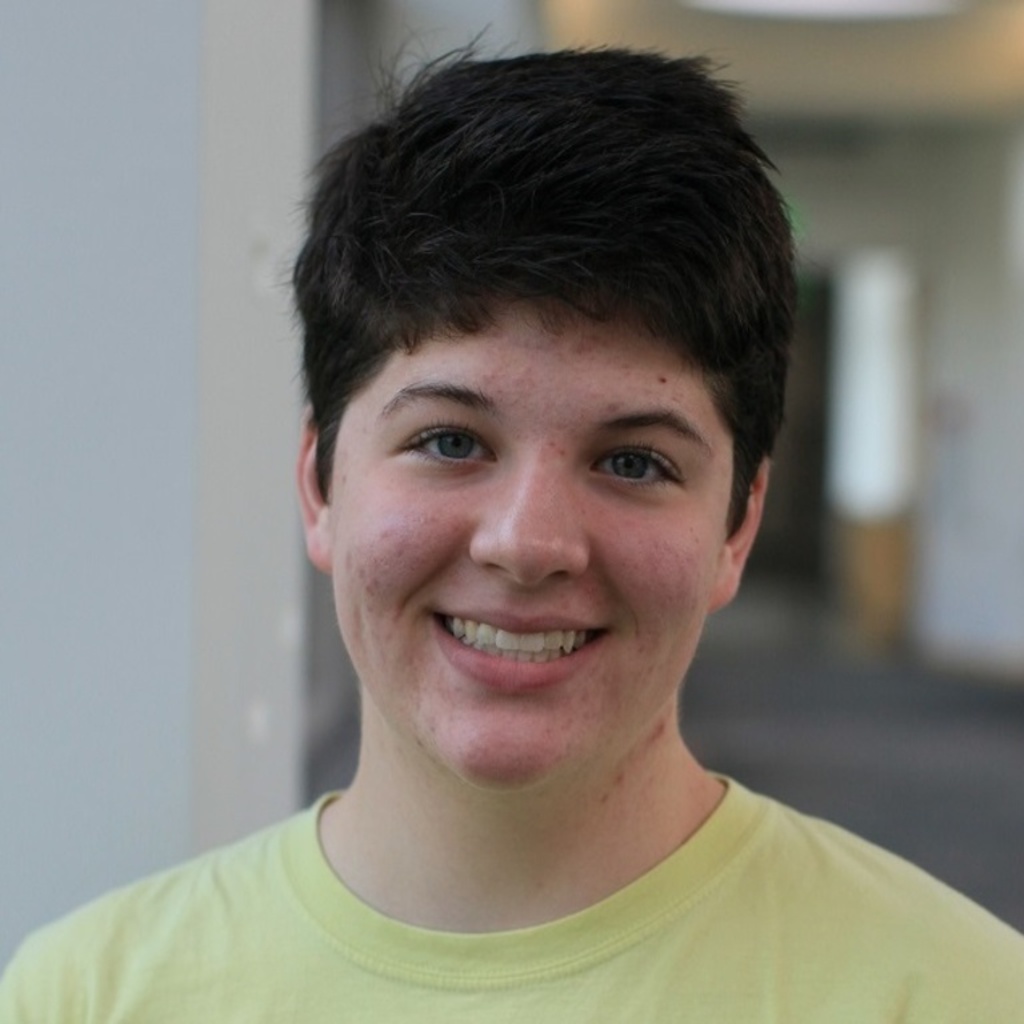
Laura Hovenga, BA
The CROI program helped me unearth my passion for research and shaped my career path in a way I never would have considered. The skills I developed and the professional network I built during this program assisted my success in both undergraduate and graduate research. These resources and the advising I received were paramount to my application and acceptance into a Molecular & Cellular Biology PhD program that same year. The CROI program was the connection I needed between my undergraduate education and graduate school.
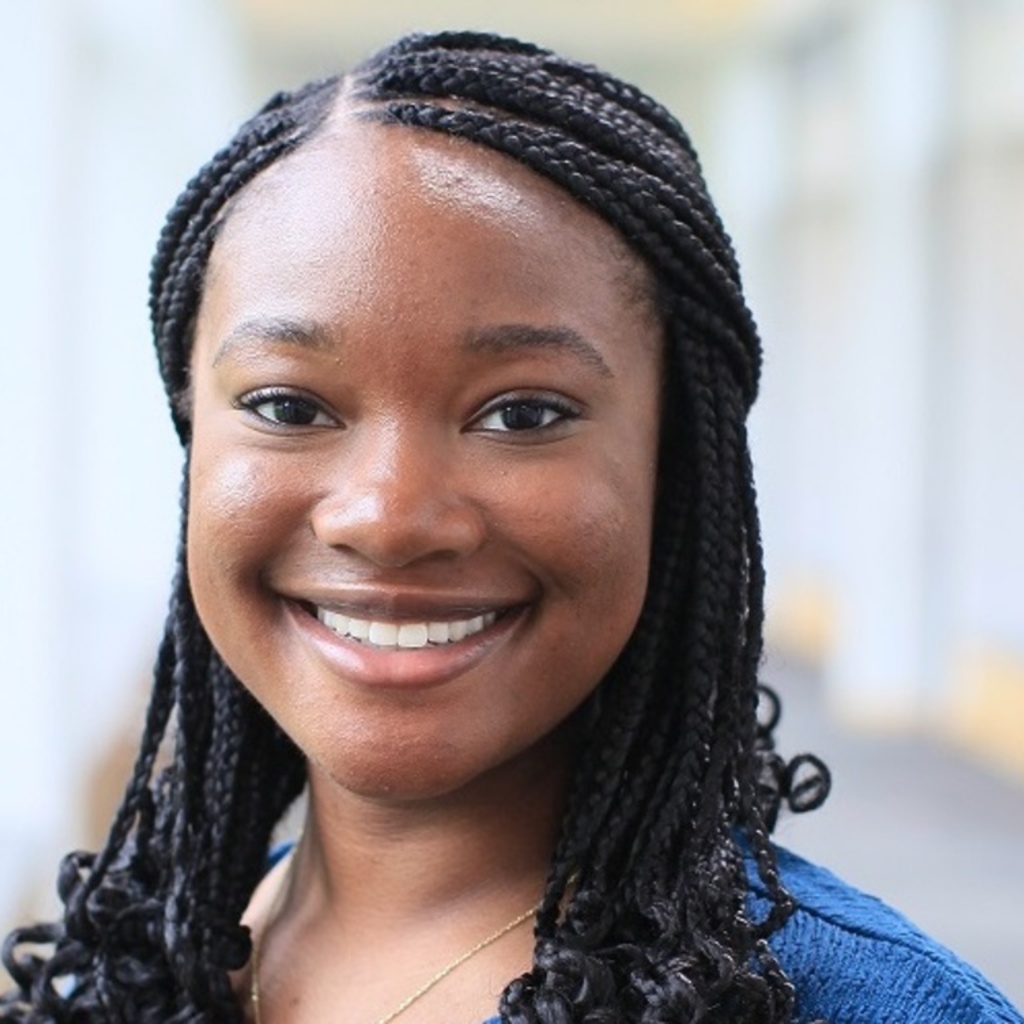
Eryka Appiah Amaning, BS
The CROI program was a truly transformative 10-week research experience. It not only deepened my understanding of cancer biology and refined my research skills but also provided invaluable exposure to leading physicians in the field of oncology. Beyond the lab, I formed lasting friendships and enjoyed exploring Iowa City. Overall, this experience reignited my passion for advancing medicine and reinforced my commitment to promoting diversity in science.